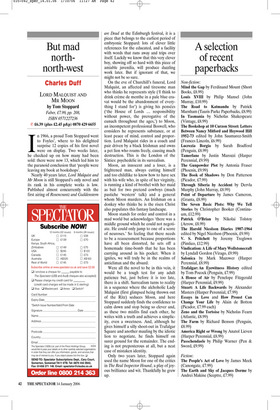But mad
north
north-west
Charles Duff
LORD MALQUIST AND MR MOON by Tom Stoppard Faber, £7.99, pp. 208, ISBN 0571227236 V £6.39 (plus £2.45 p&p) 0870 429 6655 In 1966, a proud Tom Stoppard went to Foyles’, where to his delighted surprise 12 copies of his first novel were on display. Two weeks later, he checked up on how many had been sold: there were now 13, which led him to the paranoid conclusion that ‘people were leaving my book at bookshops’.
Nearly 40 years later, Lord Malquist and Mr Moon is still Stoppard’s only novel and its rank in his complete works is low. Published almost concurrently with the first airing of Rosencrantz and Guildenstern are Dead at the Edinburgh festival, it is a piece that belongs to the earliest period of embryonic Stoppard: lots of clever little references for the educated, and a facility with words that runs away and trips over itself. Luckily we know that this very clever boy, showing off so hard with this piece of amiable juvenilia, will produce dazzling work later. But if ignorant of that, we might not be so sure.
On the eve of Churchill’s funeral, Lord Malquist, an affected and tiresome man who thinks he represents style (‘I think to drink crème de menthe in a pale blue cravat would be the abandonment of everything I stand for’) is giving his pensées (‘the House of Lords ... responsibility without power, the prerogative of the eunuch throughout the ages,’) to Moon, an incompetent professional Boswell, who considers he represents substance, or at least peace of mind, control and proportion. Lord Malquist rides in a coach and pair driven by a black Irishman and owns a pet lion who roams freely, causing much destruction. This is the London of the Sixties: psychedelic in its surrealism.
Moon, an innocent and a loser, is a frightened man, always cutting himself and too childlike to know how to have sex with his wife who, in spite of her virginity, is running a kind of brothel with her maid as bait for two pretend cowboys (much pastiche ‘western’ talk) and a general whom Moon murders. An Irishman on a donkey who thinks he is the risen Christ also populates this fantasy landscape.
Moon stands for order and control in a mad world but acknowledges ‘there was a middle ground which he could not negotiate. He could only jump to one of a score of neuroses.’ So feeling that there needs to be a reassessment because proportions have all been distorted, he sets off a homemade time-bomb that he has been carrying around in his pocket. When it ignites, we will truly be in the realms of anticlimax and the absurd.
Were all the novel to be in this vein, it would be a tough test for any adult patience but, just before it is too late, there is a shift. Surrealism turns to reality in a sequence where the alchoholic Lady Malquist (first glimpsed being thrown out of the Ritz) seduces Moon, and here Stoppard suddenly finds the confidence to calm down and stop being so clever and, as these two misfits find each other, he writes with a truth and achieves a simplicity, even a sweetness. And, although he gives himself a silly shoot-out in Trafalgar Square and another mauling by the idiotic lion to negotiate, he finds himself on surer ground for the remainder. The ending is not preposterous at all, but a neat case of mistaken identity.
Only two years later, Stoppard again used the name Moon for one of the critics in The Real Inspector Hound, a play of joyous brilliance and wit. Thankfully he grew up.














































 Previous page
Previous page